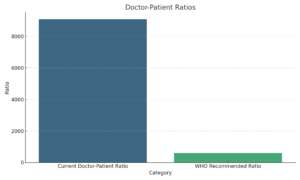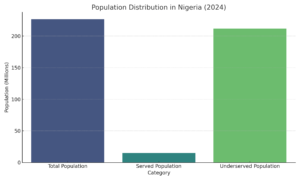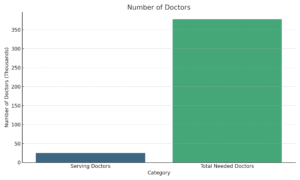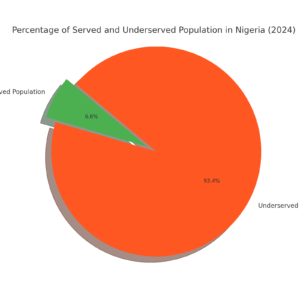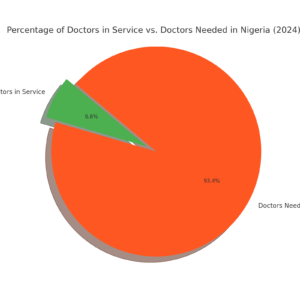The Need for AI Intervention in Combating the Wide Healthcare Gap for the Underserved Nigerian Population
Research by Gabriel Olatuja, Dr Taiwo Oni (2024)
Nigeria’s healthcare system faces significant challenges in providing adequate care to its diverse population. Disparities in healthcare access and quality disproportionately affect underserved populations, including rural communities, low-income households, and vulnerable groups like women and children. This research examines the healthcare gaps in Nigeria, focusing on the barriers and potential AI-driven solutions for addressing these disparities.
The major barriers to healthcare access are Geographical constraints which includes the lack of healthcare infrastructure and difficult access for rural community dwellers; High costs associated with healthcare and limited insurance coverage and ofcpurse, inadequate healthcare workforce with shortages of skilled healthcare professionals, especially in rural areas.
The consequences of the Healthcare Gaps include High rates of maternal and infant deaths due to inadequate prenatal care and emergency services; Prevalence of malaria, HIV/AIDS, and tuberculosis, exacerbated by poor healthcare access; limited diagnosis and treatment for conditions like hypertension, diabetes, and cancer.
IMPORTANT INSIGHTS
Nigeria’s Population: 226.5 million (Datareport, January 2024).
Current Doctor-Patient Ratio: 1:10,000 (NMA, 2022).
WHO’s Recommended Doctor-patient Ratio: 1:600.
Number of Serving doctors: 22,650
Total Number of doctors needed: 377,500
Number of Served Population:
13,590,000
Number of underserved population:
212.90M
Approximately 213 million people in Nigeria are underserved, meaning they do not have adequate access to healthcare services.
Data Visualisation
BRIDGING THE GAP
Punch reported that it would take Nigeria 20 years, at the minimum, to produce 400,000 health workers needed to fill in the gap and cater to the health needs of Nigeria’s over 220 million population. This is from the report that the country only produces an average of 3000 doctors annually. This inference factors in about 1000 doctors who relocate abroad yearly.
THE NEED FOR AI INTERVENTION TO BRIDGE THE GAP
The intervention of AI in healthcare offers tremendous potential to cater to the healthcare needs of the underserved population in Nigeria.
With a staggering 213 million people lacking access to adequate healthcare services, AI can help bridge this gap in several ways:
1. Telemedicine: AI-powered telemedicine platforms can connect patients in remote or underserved areas with healthcare professionals, enabling virtual consultations and reducing the need for physical infrastructure.
2. Predictive Analytics: AI-driven predictive analytics can identify high-risk patients, detect disease patterns, and forecast healthcare needs, enabling proactive interventions and targeted resource allocation.
3. Chatbots and Virtual Assistants: AI-powered chatbots can offer basic medical advice, triage patients, and provide health education, helping to address minor ailments and reduce the burden on healthcare facilities.
4. Diagnostic Support: AI-assisted diagnostic tools can aid healthcare professionals in diagnosing diseases more accurately and efficiently, especially in areas with limited access to specialized expertise.
5. Healthcare Access Platforms: AI-driven platforms can match patients with available healthcare resources, facilitate appointment scheduling, and provide navigation support for healthcare services.
6. Remote Monitoring: AI-enabled remote monitoring systems can track patients’ vital signs, detect anomalies, and alert healthcare professionals to potential health issues, enabling early intervention and prevention.
7. Health Education: AI-powered health education platforms can provide personalized health information, promote healthy behaviors, and encourage preventive care, empowering individuals to take charge of their health.
8. Supply Chain Optimization: AI can optimize healthcare supply chains, ensuring the efficient distribution of medical resources, equipment, and pharmaceuticals to areas of greatest need.
9. Disease Surveillance: AI-driven disease surveillance systems can monitor and track disease outbreaks, enabling swift public health responses and targeted interventions.
10. Capacity Building: AI can help train and upskill healthcare professionals, enhancing their capabilities and confidence in addressing complex healthcare challenges.
By harnessing the power of AI, Nigeria can make significant strides in addressing the healthcare needs of its underserved population, increasing access, improving outcomes, and reducing health disparities.
VIRTUAL DOCTORS‘ PROGRESS
As the CEO of Virtual Doctors, I am proud to lead a team of dedicated professionals committed to harnessing the power of technology to improve healthcare outcomes.
Our mission is to leverage AI and telemedicine to increase access to quality healthcare services, reduce healthcare costs, and enhance patient experience. We believe that everyone deserves access to quality healthcare, regardless of their location or socio-economic status.
Here are some key milestones we’ve achieved so far:
– Developed and launched a hybrid telemedicine platform that enables remote consultations and monitoring.
– Partnered with local healthcare providers to expand our reach and impact.
– Trained a team of healthcare professionals on AI applications and digital skills.
Our telemedicine platform has already shown promising results:
– Over 7,000 patients have received remote consultations and monitoring.
– We’ve reduced wait times by an average of 80%.
– Patient satisfaction ratings have increased by 90%.
But we’re not stopping there. We’re committed to continuous improvement and expansion. Our next phase includes:
– Integrating AI-driven diagnostic tools.
– Enhancing our predictive analytics capabilities.
– Establishing a robust digital infrastructure to support our services.
At Virtual Doctors, we believe that AI has the potential to revolutionize healthcare in Nigeria. We’re dedicated to harnessing this potential to create a healthier, more equitable future for all.
Download Virtual Doctors App on Google Play Store and Book an appointment with a medical doctor now
Not using Android? Book a Consultation with a doctor here now
Sources
Datareportal (2024). Nigerian Population https://datareportal.com/reports/digital-2024-nigeria#:~:text=Population%20of%20Nigeria%20in%202024,of%20the%20population%20is%20male.
Punch (2023). Nigeria has One Doctor to 10000 Patients https://punchng.com/nigeria-has-one-doctor-to-10000-patients-nma/
Punch (2023). It’ll take Nigeria 20 years to produce enough doctors, pharmacists, others – Stakeholders https://punchng.com/itll-take-nigeria-20-years-to-produce-enough-doctors-pharmacists-others-stakeholders/

